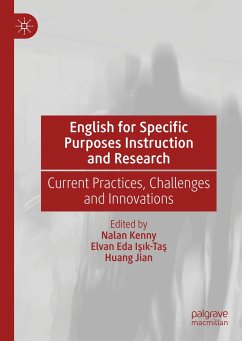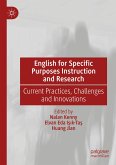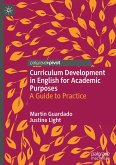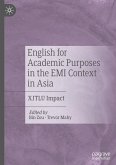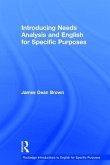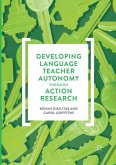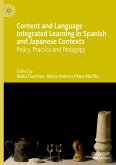English for Specific Purposes Instruction and Research
Current Practices, Challenges and Innovations
Herausgegeben:Kenny, Nalan; Isik-Tas, Elvan Eda; Jian, Huang
English for Specific Purposes Instruction and Research
Current Practices, Challenges and Innovations
Herausgegeben:Kenny, Nalan; Isik-Tas, Elvan Eda; Jian, Huang
- Gebundenes Buch
- Merkliste
- Auf die Merkliste
- Bewerten Bewerten
- Teilen
- Produkt teilen
- Produkterinnerung
- Produkterinnerung
This edited book focuses on current practices, challenges and innovations in the emerging field of English for Specific Purposes (ESP). By combining diverse, empirically-proven and innovative ESP practices from all over the world with inspiring theoretical input and reflections from experienced practitioners, the authors in this volume examine both best-practice examples and ESP programmes which by various metrics are deemed to have failed. This book will be of interest to practitioners, teacher educators and researchers working in the field of ESP, as well as readers interested in language education and curriculum development more broadly. …mehr
Andere Kunden interessierten sich auch für
![English for Specific Purposes Instruction and Research English for Specific Purposes Instruction and Research]() English for Specific Purposes Instruction and Research112,99 €
English for Specific Purposes Instruction and Research112,99 €![Curriculum Development in English for Academic Purposes Curriculum Development in English for Academic Purposes]() Martin GuardadoCurriculum Development in English for Academic Purposes45,99 €
Martin GuardadoCurriculum Development in English for Academic Purposes45,99 €![Interculturality and the English Language Classroom Interculturality and the English Language Classroom]() Interculturality and the English Language Classroom119,99 €
Interculturality and the English Language Classroom119,99 €![English for Academic Purposes in the EMI Context in Asia English for Academic Purposes in the EMI Context in Asia]() English for Academic Purposes in the EMI Context in Asia112,99 €
English for Academic Purposes in the EMI Context in Asia112,99 €![Introducing Needs Analysis and English for Specific Purposes Introducing Needs Analysis and English for Specific Purposes]() James Dean BrownIntroducing Needs Analysis and English for Specific Purposes197,99 €
James Dean BrownIntroducing Needs Analysis and English for Specific Purposes197,99 €![Developing Language Teacher Autonomy through Action Research Developing Language Teacher Autonomy through Action Research]() Kenan DikilitasDeveloping Language Teacher Autonomy through Action Research75,99 €
Kenan DikilitasDeveloping Language Teacher Autonomy through Action Research75,99 €![Content and Language Integrated Learning in Spanish and Japanese Contexts Content and Language Integrated Learning in Spanish and Japanese Contexts]() Content and Language Integrated Learning in Spanish and Japanese Contexts112,99 €
Content and Language Integrated Learning in Spanish and Japanese Contexts112,99 €-
-
-
This edited book focuses on current practices, challenges and innovations in the emerging field of English for Specific Purposes (ESP). By combining diverse, empirically-proven and innovative ESP practices from all over the world with inspiring theoretical input and reflections from experienced practitioners, the authors in this volume examine both best-practice examples and ESP programmes which by various metrics are deemed to have failed. This book will be of interest to practitioners, teacher educators and researchers working in the field of ESP, as well as readers interested in language education and curriculum development more broadly.
Produktdetails
- Produktdetails
- Verlag: Palgrave Macmillan / Springer International Publishing / Springer, Berlin
- Artikelnr. des Verlages: 978-3-030-32913-6
- 1st edition 2020
- Seitenzahl: 340
- Erscheinungstermin: 22. Januar 2020
- Englisch
- Abmessung: 216mm x 153mm x 23mm
- Gewicht: 563g
- ISBN-13: 9783030329136
- ISBN-10: 3030329135
- Artikelnr.: 57670324
- Herstellerkennzeichnung Die Herstellerinformationen sind derzeit nicht verfügbar.
- Verlag: Palgrave Macmillan / Springer International Publishing / Springer, Berlin
- Artikelnr. des Verlages: 978-3-030-32913-6
- 1st edition 2020
- Seitenzahl: 340
- Erscheinungstermin: 22. Januar 2020
- Englisch
- Abmessung: 216mm x 153mm x 23mm
- Gewicht: 563g
- ISBN-13: 9783030329136
- ISBN-10: 3030329135
- Artikelnr.: 57670324
- Herstellerkennzeichnung Die Herstellerinformationen sind derzeit nicht verfügbar.
Nalan Kenny is a language teacher specialising in English as an Additional Language at King's Leadership Academy in Liverpool, UK. She is Vice President of the International ESP Teachers' Association (IESPTA). Elvan Eda I¿¿k-Tä is an applied linguist who teaches in the TEFL and Modern Languages programmes at Middle East Technical University (METU), Cyprus. She is President of the International ESP Teachers' Association (IESPTA). Huang Jian is an applied linguist and Associate Professor at the School of Foreign Studies, Central University of Finance and Economics, China. His academic interests lie in material development for language and translation instruction and assessment, ESP teacher development and Qualitative Research.
Chapter 1: Current Practices, Challenges and Innovations in ESP (Elvan Eda Isik-Tas and Nalan Kenny).- Chapter 2: The Classroom Brain: Building Upon Collective Knowledge (Monica Rocha-Antonin).- Chapter 3: Undergraduate Students' Expectations of Persuasion and Argumentation: A Pilot Study at a Middle Eastern University (Rachel Hall Buck).- Chapter 4: ESP for Art-Major Undergraduates- From the Perspective of English Learning Motivation (Chunyan Shao, Chen Chen and Guan Shuya).- Chapter 5: Challenges in Developing ESP Classes Under the Critical Literacy Perspective (Renata de Souza Gomes).- Chapter 6: Examining the Pitfalls Behind a Failed Japanese University ESP Programme (Brian G. Rubrecht).- Chapter 7: Language Activities Aimed at Social Competencies for Nursing Students in Practice (Monika Pociask and Anna Stefanowicz-Kocol).- Chapter 8: Features of Electronic Feedback on Graduate Level Writing (Nur Yigitoglu and Yasemin Bayyurt).- Chapter 9: Language and Communication Training for Business Education: the Missing Competencies (Elena Belyaeva and Svetlana Rubtsova).- Chapter 10: The Statement of Purpose in Graduate Program Application: the Impact of Academics' Feedback on L2 Writer Identity (Elvan Eda Isik-Tas).- Chapter 11: Implications of Current Research in ESP for ESL/ESP Teacher Training (Amina Gaye).- Chapter 12: The Algerian Newly Recruited Teachers' Attitudes Towards Professional Development (Sidali Selama).- Chapter 13: Use of Action Research as a Viable Paradigm for the Professional Development of ESP Instructors (Suzan Kayanoz).- Chapter 14: Developing CLIL in Tertiary Education: Working with Tourism Texts (Mª Ángeles Escobar Álvarez).- Chapter 15: CLIL: A Public Technical University Experience (Tatiana V. Sidorenko, Yanah V. Rozanova and Olga B. Shamina).- Chapter 16: The Effects of Chat Language on Students' Academic Writing: A Case Study of Private Lebanese University Students (Wassim Al-Bekai).
Chapter 1: Current Practices, Challenges and Innovations in ESP (Elvan Eda Isik-Tas and Nalan Kenny).- Chapter 2: The Classroom Brain: Building Upon Collective Knowledge (Monica Rocha-Antonin).- Chapter 3: Undergraduate Students' Expectations of Persuasion and Argumentation: A Pilot Study at a Middle Eastern University (Rachel Hall Buck).- Chapter 4: ESP for Art-Major Undergraduates- From the Perspective of English Learning Motivation (Chunyan Shao, Chen Chen and Guan Shuya).- Chapter 5: Challenges in Developing ESP Classes Under the Critical Literacy Perspective (Renata de Souza Gomes).- Chapter 6: Examining the Pitfalls Behind a Failed Japanese University ESP Programme (Brian G. Rubrecht).- Chapter 7: Language Activities Aimed at Social Competencies for Nursing Students in Practice (Monika Pociask and Anna Stefanowicz-Kocol).- Chapter 8: Features of Electronic Feedback on Graduate Level Writing (Nur Yigitoglu and Yasemin Bayyurt).- Chapter 9: Language and Communication Training for Business Education: the Missing Competencies (Elena Belyaeva and Svetlana Rubtsova).- Chapter 10: The Statement of Purpose in Graduate Program Application: the Impact of Academics' Feedback on L2 Writer Identity (Elvan Eda Isik-Tas).- Chapter 11: Implications of Current Research in ESP for ESL/ESP Teacher Training (Amina Gaye).- Chapter 12: The Algerian Newly Recruited Teachers' Attitudes Towards Professional Development (Sidali Selama).- Chapter 13: Use of Action Research as a Viable Paradigm for the Professional Development of ESP Instructors (Suzan Kayanoz).- Chapter 14: Developing CLIL in Tertiary Education: Working with Tourism Texts (Mª Ángeles Escobar Álvarez).- Chapter 15: CLIL: A Public Technical University Experience (Tatiana V. Sidorenko, Yanah V. Rozanova and Olga B. Shamina).- Chapter 16: The Effects of Chat Language on Students' Academic Writing: A Case Study of Private Lebanese University Students (Wassim Al-Bekai).

